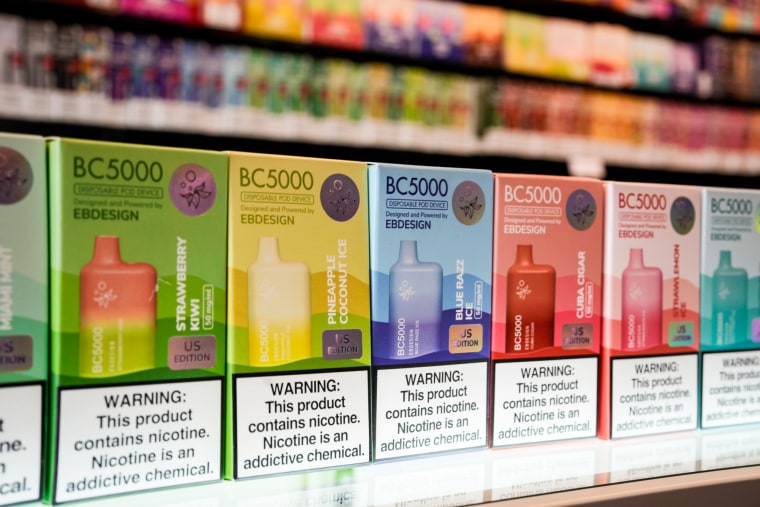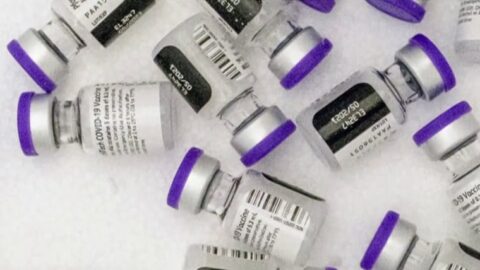Youth vaping levels fell to the lowest in a decade this year, according to a new report from the Centers for Disease Control and Prevention and the Food and Drug Administration.
E-cigarette use among middle and high school students dropped from 2.13 million students in 2023 to 1.63 million students in 2024, according to the National Youth Tobacco Survey, published Thursday.
The total is now about one-third of its 2019 peak, health officials said, when numbers totaled more than 5 million.
The latest survey ran from Jan. 22 through May 22 and included nearly 30,000 students.
“These data are a good reminder that we’re making progress in terms of continued declines of the leading tobacco products used among kids,” Brian King, director of the FDA’s Center for Tobacco Products, said on a call with reporters Wednesday afternoon. “But we’ve got to keep our guard up.”
The decrease was mainly driven by a drop in e-cigarette use among high school students, which fell from 1.56 million students to 1.21 million. There wasn’t a significant difference in use among middle school students in the past year, according to the survey — although King noted that use among middle school students has been falling since 2019.
King attributed the overall decline in part to legal steps the FDA took in partnership with the Justice Department to curb use.
Since early 2023, the FDA has issued more than 1,000 warning letters and 240 civil penalties to retailers — as well as others in the supply chain — selling Elf Bar products illegally to teens, according to a release. Elf Bar makes fruit- and candy-flavored disposable vapes that are popular among teens.
Additionally, the agency has issued import alerts for products under the Elf Bar brand, placing them on the “red list,” which allows the federal government to detain the products without a full inspection at the time of entry into the U.S.
The actions appear to have had an effect: There was a significant decline in Elf Bar use, with 36.1% of students reporting using it this year, down from 56.7% in 2023, according to the survey.
The FDA “has been pummeling on the retail sector with inspections and enforcement against those who are violating the law,” King said.
Dr. Sharon Levy, chief of the Division of Addiction Medicine at Boston Children’s Hospital, said that the latest findings are good news but there’s still a lot of work that needs to be done.
Among young e-cigarette users, 26.3% reported daily use. The majority of users preferred flavored vapes, with fruit being the most popular flavor (62.8%), followed by candy (33.3%) and mint (25.1%).
“Do we really need blue raspberry vaping on the market?” Levy said. “Limiting these kinds of things really reduces rates, so let’s go all the way. Let’s just take that one off the market.”
Levy said the way the products work are also getting more dangerous. When Juul — a popular e-cigarette brand — was introduced in 2015, it marketed itself as having the equivalent amount of nicotine as a pack of cigarettes, about 200 puffs, she said. The products on the market today are advertising as much as 15,000 puffs.
“That matters because unlike cigarettes, when vaping, there’s no stop signal,” Levy said. “It’s like popcorn. Before you know it, you’ve eaten all of it.”

The survey also found that use of nicotine pouches, including Zyn, is holding steady among adolescents, Levy said. The tobacco-free pouches, which users tuck between their lip and gums and later discard, are often undetectable because they’re smoke and spit-free.
In the survey, 1.8% of youth reported nicotine pouch use in 2024, similar to the 1.5% who reported use in 2023. That comes out to about half a million people. Of those, 22.4% reported daily use.
The most commonly reported brand among that group was Zyn, a Swedish brand that was acquired by Philip Morris in 2022.
Levy called the products “problematic” because they are often confused with the nicotine replacement therapies used by adults to help them quit smoking.
“They’re really, really different,” she said. “It’s a different form of nicotine than what’s in the FDA-certified nicotine replacement, where it gives you a slow, steady of release of nicotine that suppresses withdrawal symptoms and helps avoid cravings.”
“It’s not going to help you quit,” she added.









Recent Comments